TeachEngineering
Teach Engineering: Designing Bridges
Learners learn about the types of possible loads, how to calculate ultimate load combinations, and investigate the different sizes for the beams (girders) and columns (piers) of simple bridge design. Students learn the steps that...
TeachEngineering
Teach Engineering: Cost Comparisons
Students learn about the many types of expenses associated with building a bridge. Working like engineers, they estimate the cost for materials for a bridge member of varying sizes. After making calculations, they graph their results to...
TeachEngineering
Teach Engineering: Straw Bridges
Working as engineering teams, students design and create model beam bridges using plastic drinking straws and tape as their construction materials. Their goal is to build the strongest bridge with a truss pattern of their own design,...
The Tech Interactive
The Tech Museum of Innovation: Bridging the Gap [Pdf]
Can your team build the appropriate bridge to fit the needs of various terrains? In this lesson, students will build an assigned bridge in order to increase knowledge of various types of bridges. Students will then engage in a design...
TeachEngineering
Teach Engineering: Building Towards the Future
This curricular unit introduces students to basic Civil Engineering concepts in an exciting and interactive manner. Bridges and skyscrapers, the two most visible products of Civil Engineers, will be discussed in depth. Students will have...
TeachEngineering
Teach Engineering: Load It Up!
Students take a hands-on look at the design of bridge piers (columns). First they brainstorm types of loads that might affect a Colorado bridge. Then they determine the maximum possible load for that scenario, and calculate the...
TeachEngineering
Teach Engineering: Simulation in Healthcare
Students learn how engineering design is applied to solve healthcare problems by using an engineering tool called simulation. While engineering design is commonly used to study and design everything from bridges, factories, airports to...
Science Buddies
Science Buddies: Keeping You in Suspens(ion)
Find out the different strengths of two types of bridges, beam and suspension, by building your own. This Science Buddies science project gives you the means to find out. The Science Buddies project ideas are set up consistently...
TeachEngineering
Teach Engineering: Strength of Materials
Students learn about the variety of materials used by engineers in the design and construction of modern bridges. They also find out about the material properties important to bridge construction and consider the advantages and...
TeachEngineering
Teach Engineering: Balsa Towers
Students will build their own towers using some of the techniques they have learned. The materials will consist of balsa wood and glue. General guidelines are provided, but the students will have a lot of freedom with their design to...
TeachEngineering
Teach Engineering: Boom Construction
Student teams design their own booms (bridges) and engage in a friendly competition with other teams to test their designs. Each team strives to design a boom that is light, can hold a certain amount of weight, and is affordable to...
TeachEngineering
Teach Engineering: Does It Work? Test and Test Again
Testing is critical to any design, whether it be in the creation of new software or building a bridge across a wide river. Despite risking the quality of the design, the testing stage is often hurried in order to get products to market....
TeachEngineering
Teach Engineering: Spaghetti Bridge
Civil engineers design and construct structures such as buildings, dams, and bridges. We can explore the field of engineering by making a bridge using spaghetti. This bridge is then tested based on the weight it can carry without breaking.
Cornell University
Cornell University: Cornell Center for Materials Research: The Physics of Bridges [Pdf]
Students incorporate their knowledge of civil engineering and physics principles as they design and build a bridge within certain parameters while choosing their own materials.
Other
Sprk: Sphero Bridge Stem Challenge [Pdf]
SPRK STEM challenges are fun, interactive activities that challenge students to use creativity and team-work to move through simple steps of the design process in order to build Sphero-based creations. In this challenge students will...
A&E Television
History.com: 10 World Engineering Marvels
These remarkable feats of design and construction transformed the ways that people travel, communicate and live. For thousands of years, mankind has engineered remarkable structures such as the pyramids of Egypt and the Great Wall of...
Learn Engineering
Learn Engineering: Theory of Vibration
Did you know that some bridges have failed due to the effect of vibration? This article and video explore vibration and its importance in the design of civil structures and mechanical equipment. The article discusses all concepts covered...
Other
Pghbridges: Bridge Basics
Site defines four main factors (span, material, placement of the travel surface in relation to structure, and form) that should be considered when designing a bridge.
TeachEngineering
Teach Engineering: Art in Engineering Moving Art
Students learn how forces are used in the creation of art. They come to understand that it is not just bridge and airplane designers who are concerned about how forces interact with objects, but artists as well.
Library of Congress
Loc: Built in America
This collection documents achievements in architecture, engineering, and design in the United States and its territories. Highlights of the collection include windmills, bridges, and buildings by Frank Lloyd Wright.
Curated OER
Science Kids: Science Images: Suspension Bridge
This photo shows a common type of bridge known as a suspension bridge. The Clifton Suspension Bridge stretches over the River Avon in Bristol, England. It was designed by a famous civil engineer named Isambard Kingdom Brunel. For more...
PBS
Pbs Kids:activities and Videos: Structures
PBS site provides videos and activities are hands-on challenges that focus on the engineering design process. They use simple materials, allow for multiple solutions, and are ideal for ages 9-12.




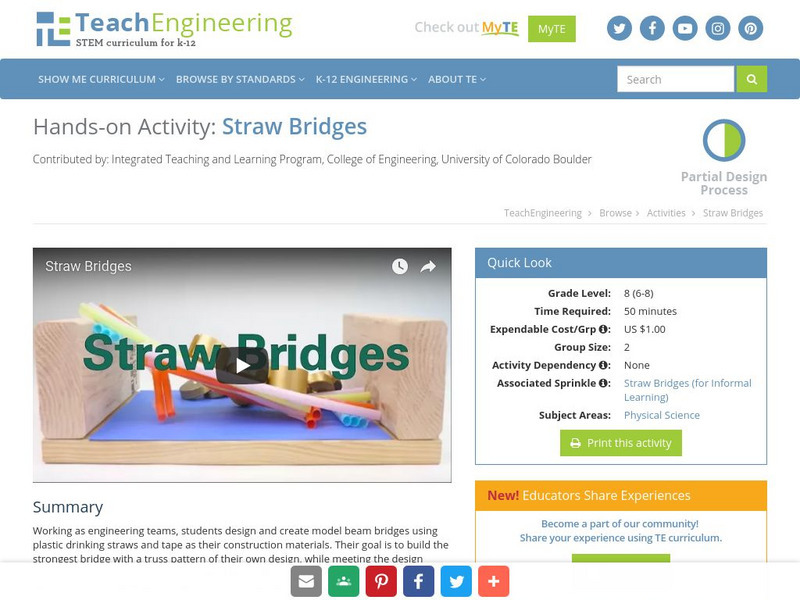
![The Tech Museum of Innovation: Bridging the Gap [Pdf] Lesson Plan The Tech Museum of Innovation: Bridging the Gap [Pdf] Lesson Plan](https://d15y2dacu3jp90.cloudfront.net/images/attachment_defaults/resource/large/FPO-knovation.png)
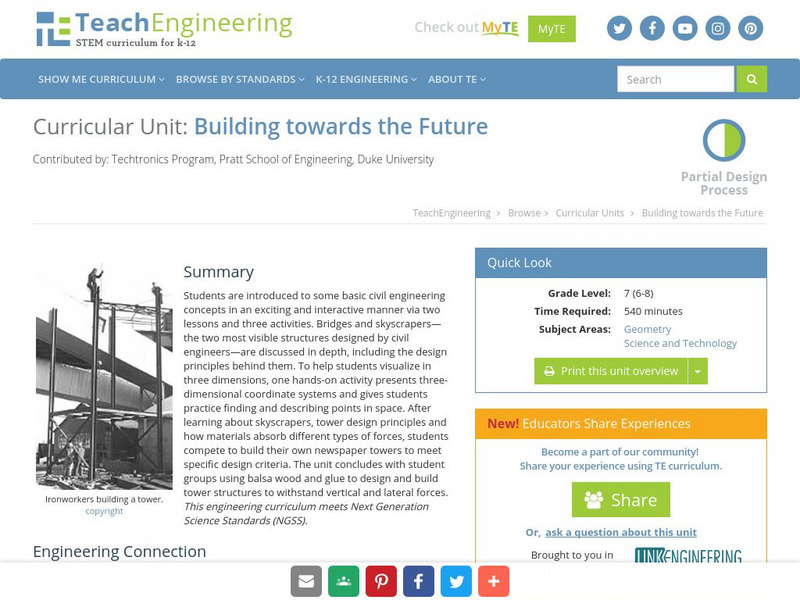

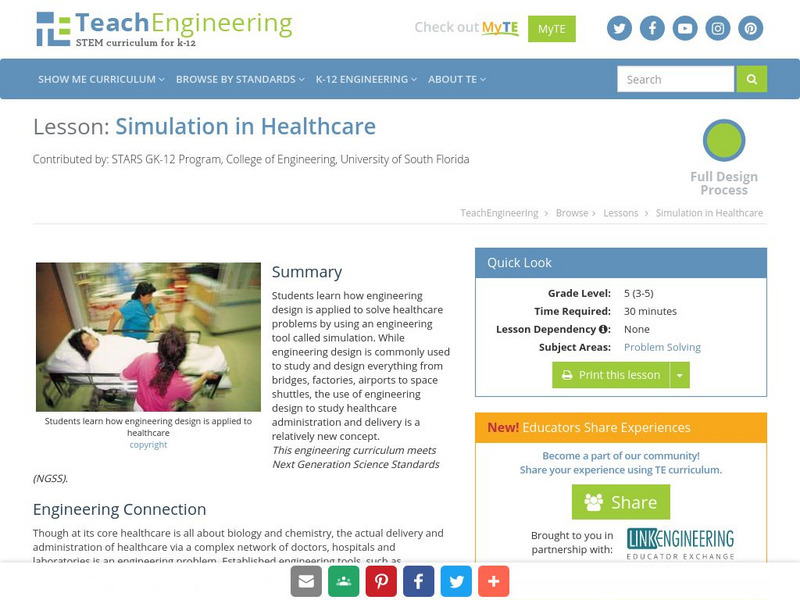
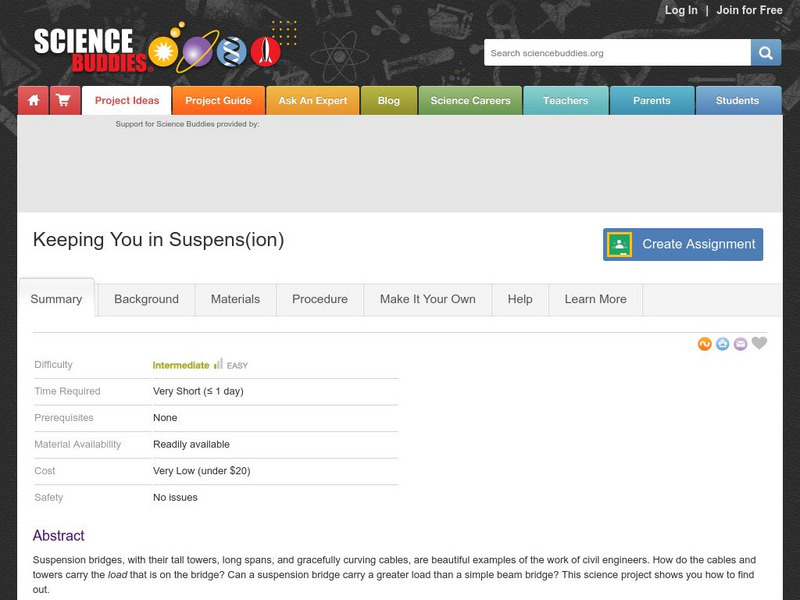
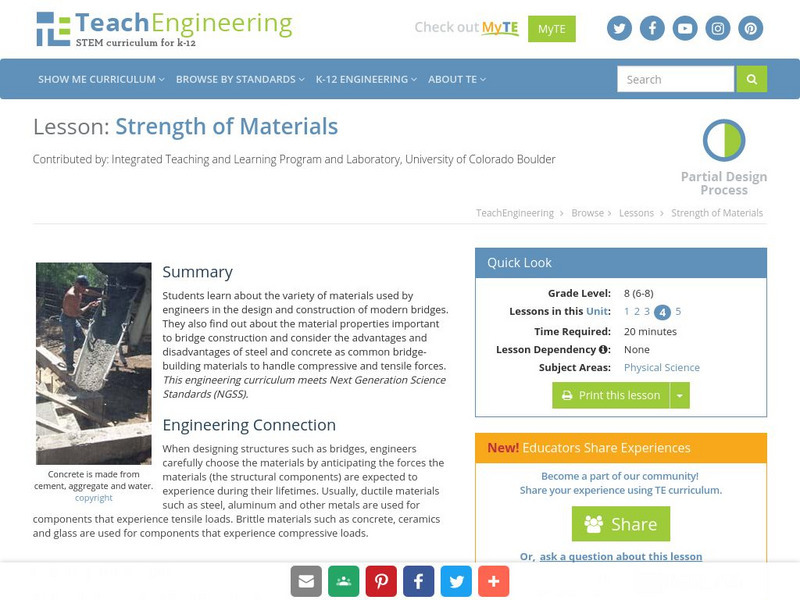




![Cornell University: Cornell Center for Materials Research: The Physics of Bridges [Pdf] Lesson Plan Cornell University: Cornell Center for Materials Research: The Physics of Bridges [Pdf] Lesson Plan](https://content.lessonplanet.com/knovation/original/179288-156db1b103cd8a925bf41eafa438c1b7.jpg?1661496214)




